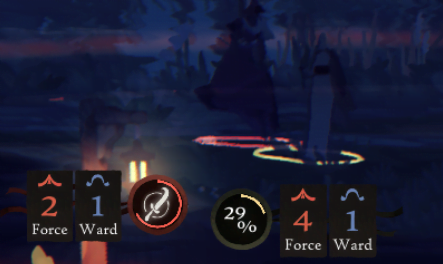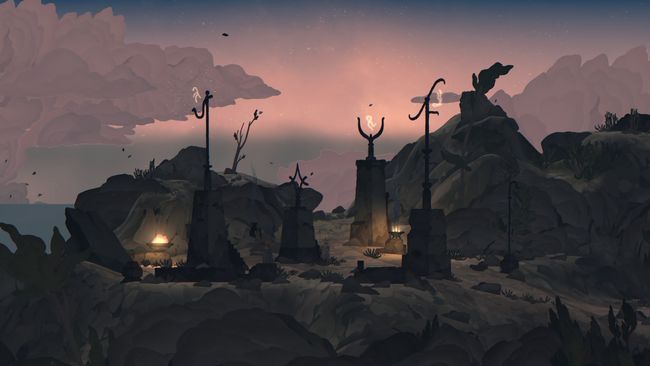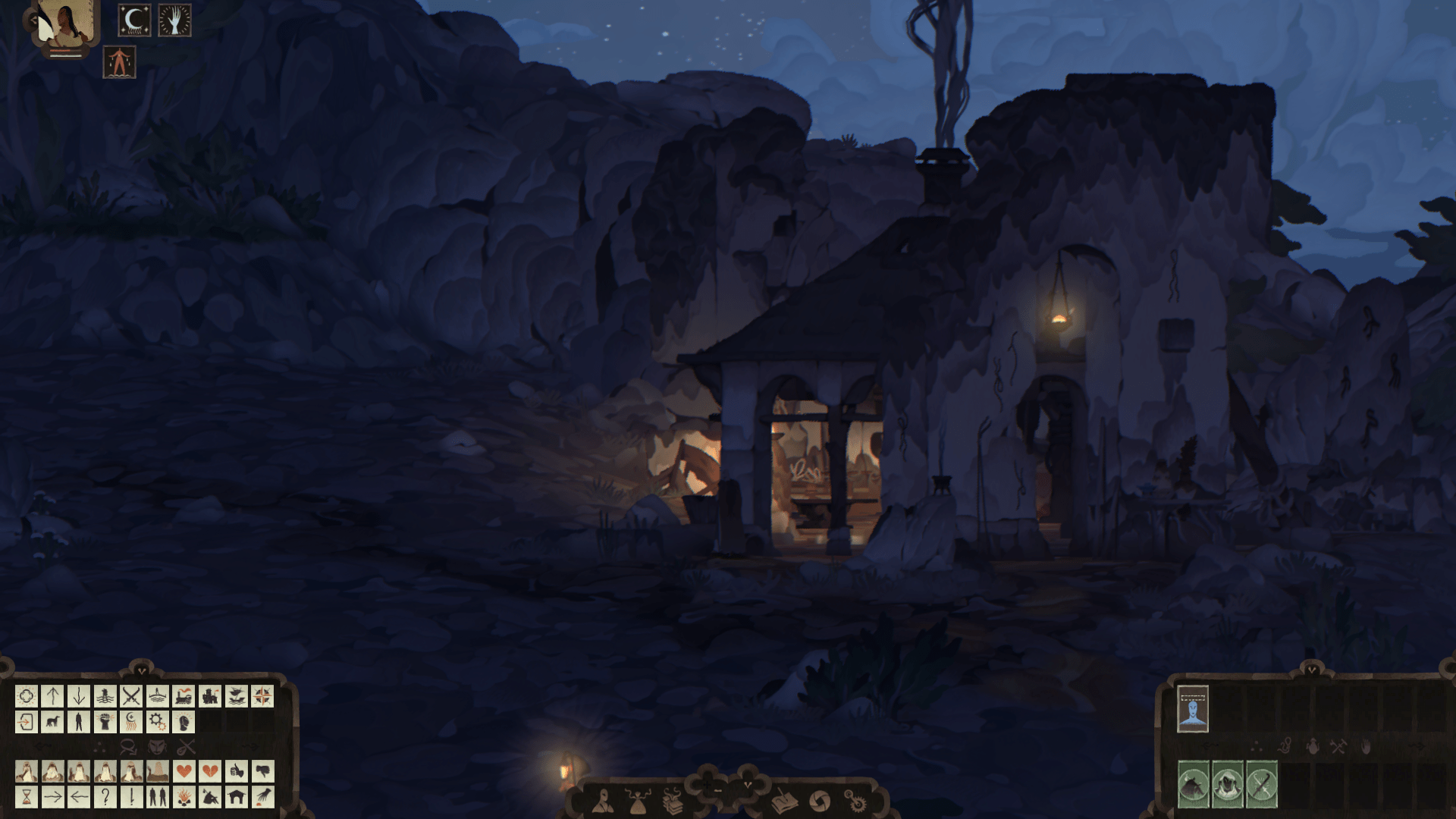Table of Contents Show
This is a largely spoiler-free new player guide to beginning your adventures in Book of Travels. The only section with specific spoilers is the accessibility, content warnings & rating section so that users with PTSD may make informed decisions.
In this guide, I’ll teach you a few key things that you need to know in order to begin your adventures in the Braided Shores. I will be as spoiler-free as possible in order not to detract from your gameplay experience too much.
The contents include (but are not limited to); how quests work, some non-spoilery advice, some basic activities, the meaning of the symbols & how to communicate with other players, how to troubleshoot different issues & how to report bugs and/or deliver suggestions to the dev team.
What this guide isn’t: a one-stop ultimate compilation guide to everything you can do, how to do it, optimal trading paths, an encyclopedia on all the teas & knots as well as a calendar of in-game events, etc.
If you’d like to connect with the rest of the Book of Travels community, navigate on over to the discord: https://discord.gg/Yq9C8Yf
Advice on how to get started
Forms & character creation
Forms are essentially the archetype of your character. They have starter skills corresponding with their overarching theme, as well as different personality traits to choose from. There’s no need to ‘min-max’ these. Pick the things which appeal to you most: you aren’t forced to learn only one wind’s skills, nor is it impossible to boost your stats.
You can find my document on the list of forms here, if side by side comparison is something you’d like to do.
The items that you start with are also largely a matter of roleplay flavor. For instance, if you picked a ‘religious’ background for your character, maybe you’d like to start with the item ‘Token of Beliefs’ or something else to that effect.
Where to spawn
After you’ve finished creating your character, a pop-up will appear asking how you arrived at the Braided Shores and what direction you were headed in. This affects your spawn point. If you’re playing with friends, select the same options to spawn together. If you want to play solo or want to meet up with friends later, pick whatever you want.
The first NPCs that you meet in your immediate surroundings will give you an idea where to go. You can follow their directions for an easy starting experience, or ignore them altogether.
Early game recommendations
- Take notes! Be it in a document on your computer or in a physical notebook of some kind. BoT has a heavy emphasis on immersion. When an NPC asks for your assistance relaying a message or expresses interest in procuring a certain type of item, there is no quest log to reflect this, because there isn’t one when someone gives you a task in real life. How much you do or don’t remember is entirely up to you. Taking notes will help you significantly to remember who you need to send that knot message to or who needs what items.
- Talk to everyone. The Braided Shore is a living world and your character earns experience by learning more about it. NPCs have a lot of interesting information to share about special events & interactions, as well as providing lore. If some adventurers at a tea house are talking about rumors of treasure at a certain location, you can actually go there.
- Travel slowly. Resources, discarded bags full of loot fallen off carts, hidden stashes and other things don’t jump out at you when you’re new. Over time, you’ll learn to recognize what is interactable in the overworld, but at first, it’s better if you just take it slow.
- Learn practical skills. Hunger, while not difficult to manage, is something that you need to pay attention to. Fishing is a good skill to pick up. Another practical skill to learn is trading with NPCs and how to do it well: what items do they value? What do they underpay for? BoT has no currency system, but all items have a median value which varies depending on who is buying or selling said item.
- Be logical. If you see a bunch of shady looking folks with their hoods up and swords at their sides, talking about all the stuff they’ve stolen: give them a wide, wide berth. Similarly, the people that you would expect teach and trade the appropriate things. Fishmongers sell fish and teach you to fish. Goods that are cheap in one place are valuable in another. By trading with different merchants, you’ll learn and develop a route of your own, as any merchant in-universe would. And don’t forget: value your life. If you feel that you’re going to lose a fight — run.
What to do
Making your own fun is imperative in a game like Book of Travels where nothing is specifically handed to you. You won’t come across a popup that tells you that there is a dungeon there to clear with 4 other players, or be told where to find a certain event or knot spell: you have to discover these yourself.
Exploration is a tangibly important thing to do. In many games, the label ‘emphasis on exploration’ tends to rhyme with ‘lack of content’. In Book of Travels, it’s actually how you find the content in the first place, be it locating deep dark dungeons to return to with more travelers, different types of rare goods, lore, quests, endeavours, or anything else.
Trading is an expansion of exploration. By speaking with different merchants, you can establish what their inventory stock is like, what goods they pay more than median price for (reflected on the item itself, if a fish is worth 20 on avg, some merchants might pay 30 for it). By learning what they like and how they trade (some are stingy, others generous), you can start making your own trade routes in which you decide what to collect and where to sell it.
Learning the story is something that you can do through listening to different rumors, going to different places, and so on. There is no clear, railroaded way about it. The world does have an overarching story, and the different in-universe groups also have their own stories.
Pursue excitement and danger (or not). While advertised as a relaxing and wholesome game experience, there is danger on the Braided Shore. Thrill-chasers have places that they can go that people who hate thrills will never dare to. There are areas which are inherently dangerous, and combat which some low-intensity gamers prefer to enjoy.
Et Al. You can fish, master skills, lead other players into danger or help them. What you do is up to what you enjoy. I find it fun to maintain my own book of travels (zing) in which I log what merchants enjoy, what types of goods they like, what my trade routes are, what events are on which day, what quests I’m paying attention to, as well as having themed characters with their own goals.
Conflict: death & fight or flight
Fighting
There are two types of fights you can get into:
- Duels: Initiated by you with friendly NPCs that will generally reference a desire to duel in dialogue. There is no penalty for losing, and neither you nor the opponent can die as a result. Think of this as combat practice.
- Deadly Combat: Initiated by either you or hostile NPCs. If you defeat them, they faint/die and you typically get loot. If they defeat you, you faint and suffer associated penalties. Read below for more on these.

This is the basic combat interface. More skills that you acquire may be added to the empty spots, but for now pay attention to the ones at the far ends. On the left we have Attack, and on the right we have Flee.
Combat is based on an initiative system. This means that NPCs that are aggressive and immediately wish to kill you will draw their weapons and open up their combat interface.

In this screenshot, let’s pay attention to two things first: the left sword circle and the red line which is trying to fill it, is how well the enemy is preparing to attack.
The 29% on the right hand side is my attack preparation. The percentage reflected is your hit chance. When you are satisfied with your chance to hit, clicking the Attack action will cause you to execute the attack at your current chance to hit. If you do not manually Attack, you will automatically attack once your chance to hit reaches 100%. Just remember, while 95% charge is a 95% chance of hitting, the enemy may hit you several times during that period! Combat is a balancing act.
When fighting, your goal is to reduce the enemy’s ward to 0. If your ward reaches 0 in Deadly Combat, you will faint, lose a life petal, and will respawn in a nearby map with low energy and a temporary negative effect card reflecting your defeat. Additionally, if you faint while fighting bandits, you will lose the first two items in your inventory.
Death
Permadeath, while controversial, is an important element of Book of Travels. When your character loses their last life petal, they become a ghost. In order to prevent this from happening, you should find different methods to restore your life petals and avoid areas that you feel are dangerous. While the devs have mentioned that death is not the end, and ghosts exist, ghost content has not been implemented yet.
Combat stats

Force is what decides the power of your attacks. Gear with red ribbons on it as depicted on the left hand side, give additional force.
Ward is a deflective shield. If your ward reaches 0 in a friendly duel, such as against Warden NPCs, nothing happens, but if your ward reaches 0 when fighting true hostiles, you’ll lose a life petal.
Speed is the speed of one’s initiative and how quickly one’s hit probability goes up. That means that in combat, a character with lots of speed and low burden will be able to attack very frequently. Additionally, just as burden reduces your movement speed outside of combat, speed increases it.
Burden is a sort of debuff. If you wear heavy armor with lots of Ward, or are wearing a pack that gives lots of slots, you’ll tend to amass a lot of burden. It lowers your movement speed and the rate at which your hit probability gauge fills.
In sum, if someone’s stats are 4/4/1/7 (Force/Ward/Speed/Burden), they don’t hit very hard, have low shield value, are encumbered and slow to strike.
Flight

Unless you’ve dragged it across your bars, the ‘Flee’ action is at the far right. By fleeing, you’ll be relocated somewhere else in your current zone and take a small debuff because you just traumatized your character, but there are no significant disadvantages to fleeing.
How to avoid combat
Low-intensity gamers rejoice, it is possible to avoid combat in almost every single scenario. Wading through rivers is a favorite of mine for sneaking past groups of enemies, but there are also certain skills that make you innocuous (no spoilers!), and it’s always possible to use the ‘Flee’ action to escape.
In general, if someone or something looks shady, unfriendly, scary, screams like a Banshee or has a red nameplate (you can see this by pressing tab), travel around them or prepare to use the Flee action.
Skills (knot spells, actions, passives, tea)
In Book of Travels, knot spells are what is understood as magic in most other fantasy settings. They have a variety of different effects; some are used in combat, others are used to buff or heal yourself or other players, others are more mundane magic for creating shelter in a storm. Passives are similarly varied.
Generally speaking; teas are exclusively support, and you may share them with other players.
Knot spells have wildly varied effects; some are support, where others may be combat oriented.
Passives also vary significantly.
In order to see what skill cards do what, right click them.
Gameplay FAQ
How do I acquire new skills?
They’re sold and available in various different locales, from different NPCs, or found in certain treasure boxes. When you meet a new NPC, consult their stock and jot down a note about it if you’re into that. Learning and finding abilities is generally fairly intuitive however; tea houses offer tea-related abilities, and so forth and so on.
How do I equip my spells?
Press S (or select skills from the menu at the bottom of your screen), select the skill. Keep in mind that if you want to REMOVE a skill, it currently wipes your proficiency in that skill.
How do I know what something does?
In the case of items in your inventory or an NPC’s, right click it for more information. Gear displays different information, such as increasing force, ward, speed, burden or your talents like physicality.
How do I increase my physicality (or any other) talent stat?
There are a few ways to do this: changing your gear, or boosting your talent stats with different skills and teas. When you acquire new pieces of gear, right click it to see what it does. While many players do themed characters in which they pursue 1-2 stats, many others are more combat-oriented and have several gear sets that they switch between in order to meet stat requirements for endeavours.
How do I acquire more gear?
Different merchants sell different things. Things are generally intuitive with this too. Explore the different merchants to learn what they sell.
How do I restore my energy
Eat or rest.
Controls
BoT is (for now) only a point-and-click with WASD support seeming to be coming on the way. As for controller support, following this guide will help make any point-and-click game into a controller supporting one: https://www.pcmag.com/how-to/turn-your-game-controller-into-a-computer-mouse
Sprint: Right click
Walk: Left Click
Voice greeting: Middle mouse button
Activate nameplate: Tab button
Debug: Right Alt (Alt Gr) or Right Ctrl
Unfortunately I don’t have a MAC or Linux-based system, so I’m unaware of the controls for those users. If you’re one of them, please let me know on discord or in the comments!
Accessibility, content warnings & rating
This section will contain some spoilers, largely to help parents decide if this game is appropriate for their children and for the sake of players suffering from PTSD. You may safely skip it if it does not pertain to you.
Game rating
While Book of Travels doesn’t have an official ESRB rating as of the time I am writing this, I would personally assign it as Rated E for Everyone (suitable for all ages) based off the ESRB’s own descriptions: Games with this rating contain content which the ESRB believes is generally suitable for all ages.[46] They can contain content such as infrequent use of “mild”/cartoon violence, and mild language.
Depictions of violence within the game world are mild/cartoony. There is no blood, no gore, but there are bladed weapons. Consumption of alcohol is considered taboo in the game’s world, but alcohol is available in some select locations. Death is mentioned, and present in the form of headstones and ghosts but that is currently the extent of it.
Accessibility
Can I play one-handed?
Yes. The game is point and click, and any interface portion that can be opened by using the keyboard, can easily be accessed with your cursor.
Is the game hard-of-hearing friendly?
So-so. While most NPCs talk, some prompts are only spoken out loud such as the ferryman warning you when the ferry is leaving, or where it’s headed, but it isn’t a hugely game changing thing, as you can just learn
Is this game visual disability friendly?
So-so. There are many different types of visual disabilities. To gauge if you can play BoT at night time, take a look at this screenshot and decide for yourself if it’s too dark.
Is there any screenshake/headbob?
Nope! I get violently nauseous on games that have it repeatedly, even if it’s “mild”. In my time playing BoT, I still haven’t had any issues.
Content warnings
In this section, I’ll blot out some spoilers with black. To see them, just click. When it comes to opting out of triggering content, the devs seem happy to offer us options and some players are currently offering their feedback on things like avoiding combat completely and removing some unnecessary mentions or reworking quests.
Violence: While combat is largely avoidable, some people who suffer from PTSD may have an episode as a result of having combat initiated on them. You can run away from combat interactions, or side-step them entirely by using a ‘port of the x’ (dog/cat/goat/deer variants are available) knot spell sold by the Traveling Knot Merchant. When transformed into an animal, you can’t communicate with other players, or loot things, but aggressive hostiles (bandits, evil sefra, etc) will ignore you.
Alcohol: Alcohol is taboo on the Braided Shores, but it’s available in the Voices Tavern in Little Slip.
Gambling: One of the playable mini-games is a gambling mini-game. While it doesn’t currently involve a gambling mechanic, it’s implied that it will in the future. It takes place in the Voices Tavern located in Little Slip.
Domestic violence: One instance in the game and it’s thankfully avoidable. The ‘Remorseful Spellcaster’ turned her spouse into a frog and expresses her remorse for letting him get away.

